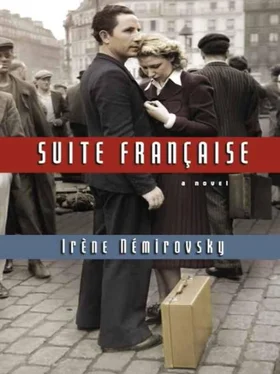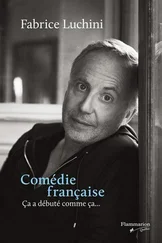"This village!" Lucile thought. "People can see through walls!"
At that very moment a storm broke. It had been brewing for several hours. There was a single, solemn thunderbolt, followed by the sound of cold rain falling in sheets. The sky darkened; all the lights went out, just as they usually did when the wind was up.
"I guess Madame will be stuck at the church now," Marthe said smugly.
She took advantage of the fact to bring Benoît a bowl of hot coffee. Lightning flashed through the kitchen; the water streaming down the window-panes looked green in the sulphurous light. The door opened and the German officer, forced out of his room by the storm, came in to ask for a few candles.
"Is that you, Madame?" he added, recognising Lucile. "Excuse me, I couldn't see you in the dark."
"There aren't any candles," Marthe said sourly. "There are no candles in all of France since your lot got here."
She didn't like the officer being in her kitchen. She could put up with his presence in other rooms, but here, between the stove and the pantry, it seemed scandalous and almost sacrilegious: he was violating the very heart of the house.
"At least give me a match," the officer implored, deliberately trying to look plaintive to soften up the cook, but she just shook her head.
"There aren't any matches either."
Lucile began to laugh. "Don't listen to her. The matches are on the stove, behind you. And actually, there's someone here who wants to speak to you, Monsieur; he has a complaint about a German soldier."
"Oh, really? I'm listening," the officer said eagerly. "We insist that the soldiers of the Reichswehr behave with perfect correctness towards the local people."
Benoît said nothing.
It was Marthe who spoke. "He's chasing after his wife," she said in a tone of voice that made it difficult to tell exactly what she was feeling: virtuous indignation, or regret she was no longer young enough to be prey to such outrages.
"Ah, but you overestimate the power we German officers have, my boy. Of course I can punish him if he bothers your wife, but if she likes him…"
"It isn't no joke!" Benoît growled, taking a step towards the officer.
"Excuse me?"
"It isn't no joke, I'm telling you. We didn't need you dirty…"
Lucile let out a cry of anguish and warning. Marthe jabbed Benoît with her elbow; she guessed he was going to say the forbidden word "Boche," punishable by imprisonment. Benoît forced himself to stop.
"We don't need you running after our women now."
"Well, you should have thought about defending your women before, my friend," the officer said quietly. His face had turned bright red; he looked haughty and upset.
Lucile intervened. "Please," she said softly, "this man is jealous. He's suffering. Don't push him over the edge."
"What's the name of this man?"
"Bonnet."
"The Commandant's interpreter? I have no control over him. He has the same rank as me. It would be impossible for me to intervene."
"Even as a friend?"
The officer shrugged his shoulders. "Impossible. Let me explain."
"No point explaining!" Benoît cut in, his voice calm and bitter. "There are always rules for the poor bloke who's a private. Verboten, as you say in your language. But no one bothers the officers if they want to have a good time! It's the same in all the armies in the world."
"I certainly won't speak to him," replied the German, "because that would be letting him in on the game and I wouldn't be doing you any favours," and turning his back on Benoît, he walked over to the table.
"Make me some coffee, my dear Marthe, I'm leaving in an hour."
"Manoeuvres again? That's three nights in a row," exclaimed Marthe, who couldn't seem to manage to keep her feelings towards the enemy straight. Sometimes, when the regiment came back in the early hours of the morning, she would say with great satisfaction, "Look how hot and tired they are… Oh, that makes me feel good!" But sometimes she'd forget they were German and would feel a sort of maternal pity rising up in her: "Still, those poor boys, what a life…"
For some reason, this evening saw a surge of feminine tenderness. "All right, I'll make you some coffee. Sit down over there. You'll have some as well, won't you, Madame?"
"No…" Lucile started to say.
Meanwhile, Benoît had disappeared; he'd climbed out of the window without making a sound.
"Please say yes," murmured the German softly. "I won't be bothering you much longer: I'm leaving the day after tomorrow and there's talk of sending my regiment to Africa when I get back. We'll never see each other again and I would like to think you don't hate me."
"I don't hate you, but…"
"I know. Let's leave it at that. Just agree to keep me company…"
Marthe laid the table with the tender, complicit, scandalised smile of someone secretly giving bread and jam to naughty children who should be punished. On a clean cloth, she placed two large earthenware bowls decorated with flowers, a piping-hot pot of coffee and an old oil lamp she'd taken out of the cupboard, filled and lit. Its soft yellow flame lit up the copperware on the walls.
The officer looked at it with curiosity. "What do you call that, Madame?"
"That's a warming pan."
"And that?"
"A waffle iron. It's nearly a hundred years old. We don't use it any more."
Marthe came in with some jam in an engraved glass dish and an enormous sugar bowl; with its bronze feet and carved lid, it looked like a funeral urn.
"Well, at this time the day after tomorrow," said Lucile, "you'll be having a cup of coffee with your wife, won't you?"
"I hope so. I'll tell her about you. I'll describe the house to her."
"Has she ever been to France?"
"No, Madame."
Lucile was curious to know whether the enemy liked France, but a kind of modest pride prevented her from asking. They continued drinking their coffee in silence, not looking at each other.
Then the German told her about his country: the wide avenues in Berlin, what it was like in winter, the snow, the biting cold air that blew in from central Europe, the deep lakes, the pine forests and sand quarries.
Marthe was longing to join the conversation. "Is it going to last long, the war?" she asked.
"I don't know," the officer said, smiling and with a slight shrug of the shoulders.
"But what do you think?" Lucile then asked.
"Madame, I am a soldier. Soldiers don't think. I'm told to go somewhere and I go. Told to fight, I fight. Told to get myself killed, I die. Thinking would make fighting more difficult and death more terrible."
"But what about enthusiasm…"
"Madame, forgive me, but that's a term a woman would use. A man does his duty even without enthusiasm. Perhaps that's the way you know he's a man, a real man."
"Perhaps."
They could hear the rain rustling in the garden, the last droplets slowly dripping off the lilacs; the fish pond murmuring languidly as it filled with water. The front door opened.
"It's Madame, hurry!" whispered Marthe, terrified. And she pushed Lucile and the officer outside. "Go through the garden! Good Lord, she'll give me hell!"
She quickly poured the remaining coffee down the sink, hid the cups and put out the lamp. "Do you hear me? Hurry up! Thank goodness it's dark out."
They both went outside. The officer was laughing. Lucile was trembling a little. Hidden in the shadows, they watched Madame Angellier walk through the house behind Marthe, who carried a lamp. Then all the shutters were closed and the doors locked with iron bars.
"It's like a prison," the German remarked on hearing the creaking of the hinges, the rusty chains and the mournful sound of the great doors being bolted. "How will you get back in, Madame?"
"Through the side door in the kitchen. Marthe will leave it open. What about you?"
Читать дальше

![Константин Бальмонт - Константин Бальмонт и поэзия французского языка/Konstantin Balmont et la poésie de langue française [билингва ru-fr]](/books/60875/konstantin-balmont-konstantin-balmont-i-poeziya-francuzskogo-yazyka-konstantin-balmont-et-thumb.webp)










